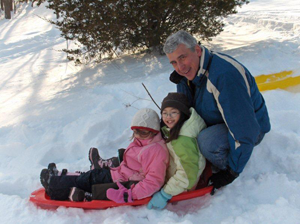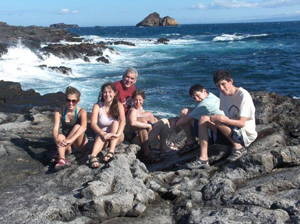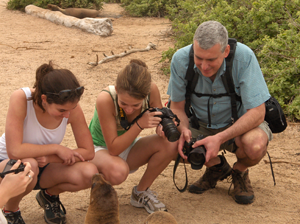Story Project: Jim's XL Blanket
by Stephanie Glennon
My husband, an internist by training, the outward picture of health, father of our four school-aged children, felt a persistent ping of low-level pain. It felt different enough from a muscle strain that he had an ultrasound on a Thursday in late June. His doctor called him that night and described an oddity in the resulting pictures.
At minutes after noon the following Monday, a surgeon at the Lahey Clinic was pointing to a CAT scan of my husband’s pancreas and saying, “This is your tumor…” She added that a radiologist had seen shadows on my husband’s liver. From that moment, he was a full-time patient and I was a full-time caregiver.
My Homework Assignment: Lotsa Helping Hands
One of the first semi-coherent calls I made was to a lifelong friend who happens to be a psychotherapist. During lulls among my coughing sobs, she said she was going to give me a homework assignment; a friend of her husband’s, she told me, had launched a web site after his wife was diagnosed with and died from cancer. My assignment was to go to the Lotsa Helping Hands web site and start up a Community of our own.
 She knew what the coming flood would be like once the shock began to subside. She knew, though I did not yet, how helpful such a Community could be.
She knew what the coming flood would be like once the shock began to subside. She knew, though I did not yet, how helpful such a Community could be.
The first step was to name our Lotsa Community. I had just received an email from a friend my husband and I had known since college. Julie wrote: "Sometimes it helps to know that you have a wide blanket of people holding you and loving you, even if it is from a distance, and even if it has been a long time since you have been together."
My immediate impulse—particularly given that my husband, at 6’ 4”, towered over me—was to use Julie’s metaphor. Our Lotsa Community became “Jim’s XL Blanket.”
"How Can I Help?"
Everyone who ever has been or will be in our situation will get the same question from family, friends, neighbors, and colleagues: “How can I help?”
 Having been a friend to someone with a terminal illness, I know the question is both heartfelt and difficult to answer. And by then I knew it was difficult to ask for help. With the Lotsa Community, we could answer: “We can send you an invitation to our site.” Because tasks can be posted, we did not feel we were imposing on people: if members saw something they wanted to help with, they could just sign up on the calendar.
Having been a friend to someone with a terminal illness, I know the question is both heartfelt and difficult to answer. And by then I knew it was difficult to ask for help. With the Lotsa Community, we could answer: “We can send you an invitation to our site.” Because tasks can be posted, we did not feel we were imposing on people: if members saw something they wanted to help with, they could just sign up on the calendar.
Within days, there were nearly a hundred members, then a hundred more. I was so distraught I was barely capable of being force-fed, let alone providing food for our family. Two of my sisters-in-law enthusiastically joined as Coordinators. Within hours of their posting a request for meal deliveries for six during my husband’s initial treatments, with dauntingly detailed and conflicting dietary needs and restrictions and allergies (easily accessed by clicking on the details for the task at hand); three months of lovingly cooked meals were scheduled to be prepared and delivered.
With that large a Community, it seemed there was no task that could be posted without an immediate response: “Your daughter needs to get to Connecticut this weekend? I’m driving to New Jersey to visit my family. I can drop her off.”
In a recent New York Times article (“Watching Them Watching Me”), the author wrote about losing his wife to suddenly diagnosed cancer while caring for their school-age sons. His discussion of choices he had to make between being by his wife’s side and tending to some of the chores of everyday life with children, led me to muse that he likely did not have the advantage of a Lotsa Community like ours.
How to Spend Our Time
Sparing a caregiver or other loved ones from chores is much more than a matter of logistics. Being part of our own Community was a gift to us of both compassion and of precious emotional energy and time. It was not simply that we no longer had to worry about everyday tasks which still had to be done—driving children to and from school and rehearsals and friends’ houses, picking up milk, giving the dogs some attention, raking mountains of leaves—but that when my children and I had time with my husband, it was time when we could give each other our complete attention. My husband, too, could be relieved of the worries inherent in keeping our daily lives going.  The illness alone was far too much to worry about.
The illness alone was far too much to worry about.
My husband’s time was limited: pancreatic cancer, as he put it to our children when we had to break the news, is “not the kind of cancer I would have chosen.” It has the highest mortality rate, no matter how young or otherwise healthy the person afflicted.
On Valentine’s Day, members of our Lotsa Community brought us a feast that included all of our dream foods. It was one of the very last meals my husband could eat and enjoy. Last February also brought our youngest daughter’s bittersweet birthday, which we all knew would be the last with him. Members of our Lotsa Community flooded her with cards and sweet words and let her know how many people, through loving her father, would continue to hold all of us in their hearts as well.
During a series of frightening emergency hospitalizations last winter I could text my sister-in-law and tell her we needed help: by the time I came home, the word would have gone out on Lotsa and our paths would have been shoveled and salted so I would not slip in the dark; icy snow would have been raked off the roof, far beyond my reach; the beagles would have been fed and soothed and walked; and someone would have made sure our youngest daughter was picked up from school and fed, and a light turned on so I would not come inside and see only black.
As a caregiver it also was an enormous gift to me to be able to post updates to this Community about my husband’s condition. Being able to post information about his treatment and condition alleviated two competing problems by instantly spreading the information my husband wanted to give to those with whom we wanted to share it. In one set of keystrokes we could fill in both those who deemed it too intrusive to ask the questions, and spare my husband endless exhausted hours on the phone repeating information and answering the same questions from a vast number of family members and friends who were anxious to know what was happening.
I used Lotsa when I could not speak without choking up and dissolving. I used it to tell the people who loved my husband when we found out his condition was not curable, and to tell them our children “would still need that great big blanket, too.” I used it to let people know when it was time to say goodbye in whatever way they wanted to say it. And I used it to let them know he had been able to come home, where he wanted to be, surrounded and held by all of us and in peace and comfort when he died. This was perhaps the most significant gift of all, because keeping in touch with the people who were important to him allowed my husband to die with his characteristic grace, and without regret for anything left unsaid or undone.
“Live-blogging Love and Loss”
Posting updates and receiving responses to them also evolved into a form of therapy that has carried me through. Tentatively, I began expanding the posts. Soon some of them read more like short stories, and members of our Community asked if they could share them with people they knew who had experienced similar strains. Beginning with those administrative updates, I wrote and wrote, mostly for our children. I have ended up with a book for my children, and someday for the grandchildren who will not know my husband. It literally grew from updates on the Lotsa site.
 Months after my husband passed away, I realized people continue to access our site and still want to know how we are doing and to talk about my husband Jim. Indeed, I got another request to join the LHH site yesterday.
Months after my husband passed away, I realized people continue to access our site and still want to know how we are doing and to talk about my husband Jim. Indeed, I got another request to join the LHH site yesterday.
From this Community web site (with considerable help from one of my tech-savvy daughters) was born a blog, “Live-Blogging Love and Loss,” that is yet another gift to me and our children and friends. It helps me to carry on with the challenge issued by the Reverend at my husband’s memorial service, to “Live your lives as though you knew this man.” He was a man who should be known, and by writing about him and his life I can help him be known by more than the lucky ones who befriended him during his all-too-short years with us.
Through that homework assignment my friend initially gave me, we renewed and strengthened countless connections; we were blessed with kindness after kindness from people we knew well to people in our “real-life” Community whom we barely had known; and I learned the tremendous value of being open in talking about love and loss.



